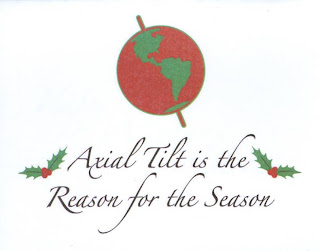I saw a multitude of posts last night and today saying that Jesus is the real reason for the 25th of December. It's not family, friends, good food, sharing, giving and camaraderie. These are not reasons we celebrate the day. No, we have to have Jesus. I don't know if it's a lack of knowledge or just an amazing ability to ignore the truth.
For those of you who actually think Jesus (if he ever existed) was born on this day, let me ask you this. Ever seen shepherds herd sheep in the middle of winter? Yes, I know the Bible is riddled with inaccuracies and most people just turn a blind eye to the literal word of god when it so chooses them. And this might be another one of those instances. But I'll still press on and continue my history lesson on why this day has traditionally been the day of celebration. And no, it's not the birth of Jesus.
Hundreds of years before Christianity became a religion, the inhabitants of ancient Europe celebrated the winter solstice. The days were starting to get longer. The worst of the winter was behind them. The winter solstice signified a hope for the coming spring. For many, the evergreen trees reminded them of a bountiful year past. They brought these trees into their homes as a sign of hope for the future. They believed the trees would ward off evil spirits and illnesses. Others believed that winter happened because the sun was getting weaker and the solstice was a sign that the sun was getting stronger. It was a reason to celebrate.
The Norse called the winter solstice, Yule. For them too, it was an end to days of darkness and a return of the sun. They brought in large logs into their homes and set fire to them. Some of these logs would last 12 days. They feasted and celebrated while the logs would burn. This was the origin of the 12 days of Christmas that has become commonplace now.
The Romans celebrated Saturnalia in honour of Saturn, the god of agriculture. The Romans didn't have the harsh winters of Scandinavia and Germany. For them it was a hedonistic time. They feasted and drank. December 25th was also the birth of the Roman sun god, one of the most sacred days of the year.
In the 4th century CE, when Christianity was still a fledgling religion with but a handful of followers, the Christian leaders had to do all they could to make their religion more acceptable to the locals. They incorporated many pagan rituals into their traditions. Pope Julius I declared the 25th of December to be the day Jesus was born, borrowing from the winter solstice festivals of Europe and the birth of the sun god. And this, mind you, happened sometime between 337 and 352 CE. Not when Jesus was purportedly alive. Not even right after his death. It was a good 300 years later. This date was chosen so that the pagans would still be able to celebrate their festivals (like they had done for hundreds of years) even after converting to Christianity. This increased the chances that Christianity would be popularly embraced throughout Europe. Whatever you say about them, you have to admit, the church leaders were smart.
Over the ages, the bringing of the evergreen tree into the house and decorating it died down until it was reinstated sometime in the sixteenth century in Germany. It didn't catch on in England until the Victorian era when Queen Victoria and the German Prince Albert were pictured standing around a Christmas tree. From there it spread to America and became the Christmas tree that we know today.
Kissing under the mistletoe also has its origins in Norse, and not Christian, mythology. Legend has it that when the god, Baldur was born, his mother, Frigga made all plants, animals and inanimate objects promise that they wouldn't harm Baldur. Somehow the mistletoe escaped this promise and Loki tricked another god into killing Baldur with a spear tipped with mistletoe. After Baldur's death, it was decreed that the mistletoe would bring love and not death. People passing under a mistletoe would kiss in memory of Baldur.
While the main point of this post was to show that Christmas is not really the day Jesus was born, I included the Christmas tree, the yule log, and kissing under the mistletoe to show how many pagan rituals were incorporated into Christian traditions. So why not let this day be about what it really is - goodwill, peace and a hope for the future. Why make it about the mythical birth of a mythical person? And if you really want to celebrate somebody's birth, let's celebrate the birth of Isaac Newton who we know for a fact was born on this day.
Happy Saturnalia or Newtonmas everyone!


No comments:
Post a Comment